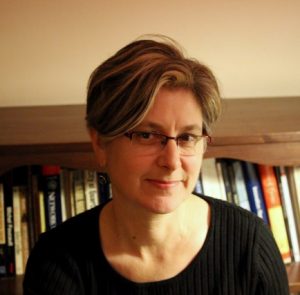<
div>
<
div>
<
div><a href=”https://www.religiousstudiesproject.com/tag/ngos-series/
<
div>
<
div>
<
div><a href=”https://www.religiousstudiesproject.com/tag/ngos-series/
 American evangelical Christian organizations comprise a significant contingent of the global anti-trafficking movement, and mobilize considerable financial resources around a moral objection to prostitution and sex trafficking. In this interview, we talk with Elena Shih about her ethnography of missionary vocational training rehabilitation projects that train sex workers in Beijing and Bangkok to make jewelry that is sold in the United States, and what this can show us about transnational dynamics of religious activism and non-governmental organizations enacted through the corollary motives of salvific evangelism and social entrepreneurship.
American evangelical Christian organizations comprise a significant contingent of the global anti-trafficking movement, and mobilize considerable financial resources around a moral objection to prostitution and sex trafficking. In this interview, we talk with Elena Shih about her ethnography of missionary vocational training rehabilitation projects that train sex workers in Beijing and Bangkok to make jewelry that is sold in the United States, and what this can show us about transnational dynamics of religious activism and non-governmental organizations enacted through the corollary motives of salvific evangelism and social entrepreneurship.
 The critical situation of the Rohingyas has cast a shadow over Myanmar’s process of democratization and drawn attention to some aggressively un-civil sectors of this Buddhist majority country’s Muslim minority population. In this interview with Melissa Crouch, we will talk about her recent research on Myanmar’s Muslim population and about the role played by the international community – and by religious NGOs in particular – in relation to the escalation of violence targeting the Rohingyas.
The critical situation of the Rohingyas has cast a shadow over Myanmar’s process of democratization and drawn attention to some aggressively un-civil sectors of this Buddhist majority country’s Muslim minority population. In this interview with Melissa Crouch, we will talk about her recent research on Myanmar’s Muslim population and about the role played by the international community – and by religious NGOs in particular – in relation to the escalation of violence targeting the Rohingyas.
 A response to Melissa Crouch on “Muslims, NGOs, and the future of democratic space in Myanmar” By Paul Fuller
A response to Melissa Crouch on “Muslims, NGOs, and the future of democratic space in Myanmar” By Paul Fuller
 Religious NGOs play significant roles in service delivery, community organization, advocacy and mediating flows of information and resources across the globe. Their religious inflections can both enhance the effective reach of particular projects and complicate the already fraught policy environment in which NGOs operate.While policy frameworks influence the kinds of activities that religious NGOs are able to undertake and aim to govern practice, the way this takes place in context is an empirical question. In this interview, we talk with Erica Bornstein about her studies of religious giving and social activism in India and Africa, and what the results of her research contribute to our understanding of the complex configurations of ‘Faith-Based Organizations’ across diverse religious contexts.
Religious NGOs play significant roles in service delivery, community organization, advocacy and mediating flows of information and resources across the globe. Their religious inflections can both enhance the effective reach of particular projects and complicate the already fraught policy environment in which NGOs operate.While policy frameworks influence the kinds of activities that religious NGOs are able to undertake and aim to govern practice, the way this takes place in context is an empirical question. In this interview, we talk with Erica Bornstein about her studies of religious giving and social activism in India and Africa, and what the results of her research contribute to our understanding of the complex configurations of ‘Faith-Based Organizations’ across diverse religious contexts.
 A Response to Erica Bornstein on “Beyond ‘Faith-Based Organizations’: Religion and NGOs in Comparative Perspective” By Chika Watanabe
A Response to Erica Bornstein on “Beyond ‘Faith-Based Organizations’: Religion and NGOs in Comparative Perspective” By Chika Watanabe
 While the service provision activities of some religious NGOs complement and enhance systems of low state capacity, in others they compete with state services and in still others service delivery by religious NGOs is associated with political parties and forms part of their electoral strategies. Across diverse engagements, then, religious NGOs depend on their ability to elude, enrol, and subvert the state institutions – while states themselves adjust to the impact of these new actors in turn. In this interview with Robert Hefner about his research on Muslim NGOs in the Javanese city of Yogyakarta, and what his findings can show us about Islam and civil society in contemporary Southeast Asia.
While the service provision activities of some religious NGOs complement and enhance systems of low state capacity, in others they compete with state services and in still others service delivery by religious NGOs is associated with political parties and forms part of their electoral strategies. Across diverse engagements, then, religious NGOs depend on their ability to elude, enrol, and subvert the state institutions – while states themselves adjust to the impact of these new actors in turn. In this interview with Robert Hefner about his research on Muslim NGOs in the Javanese city of Yogyakarta, and what his findings can show us about Islam and civil society in contemporary Southeast Asia.
 A response to “Muslim NGOs and Civil Society in Indonesia: An Interview with Robert Hefner” by John Thibdeau
A response to “Muslim NGOs and Civil Society in Indonesia: An Interview with Robert Hefner” by John Thibdeau